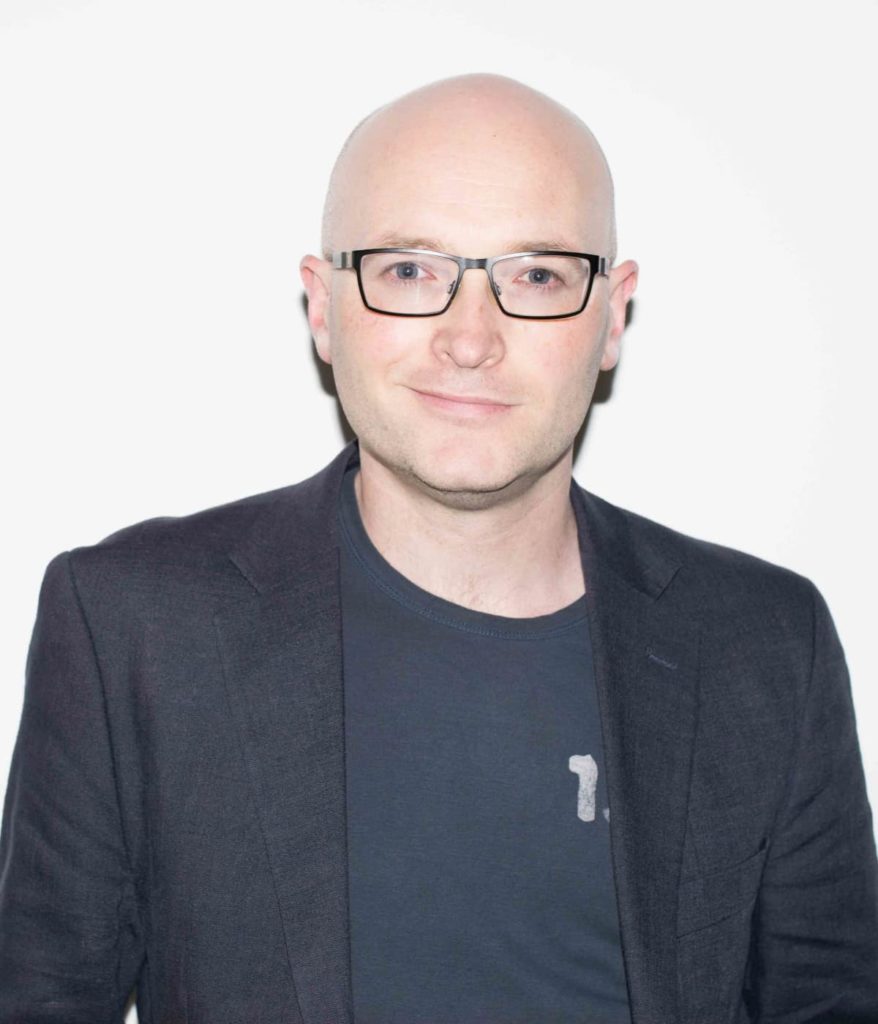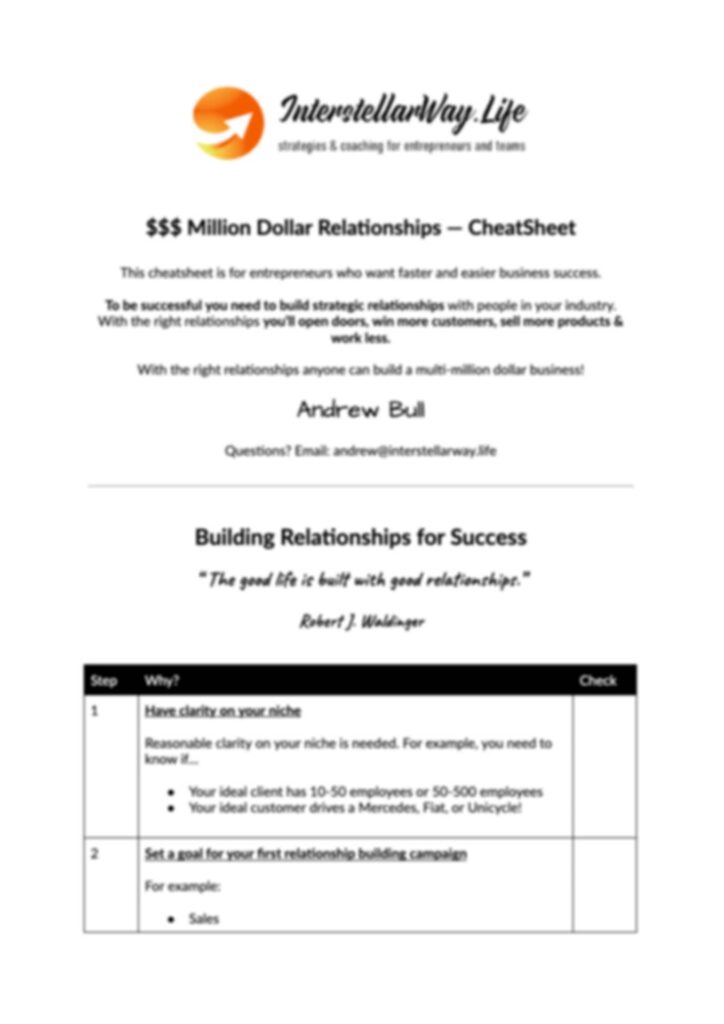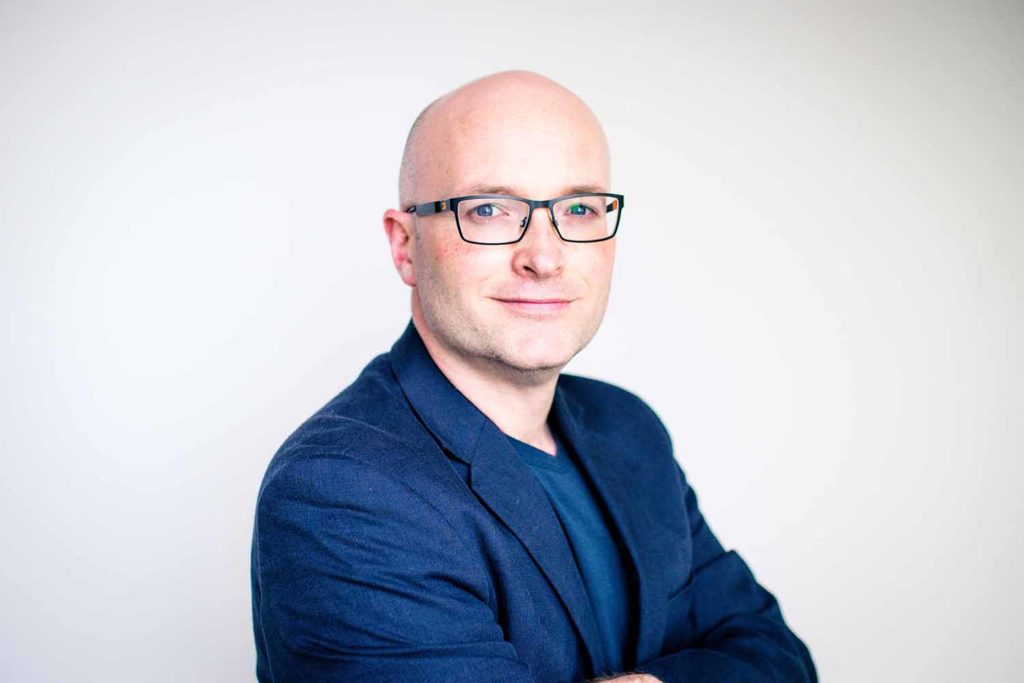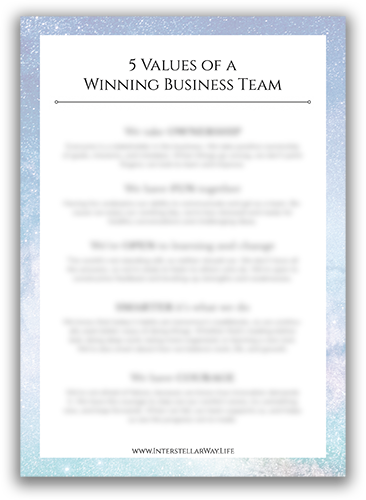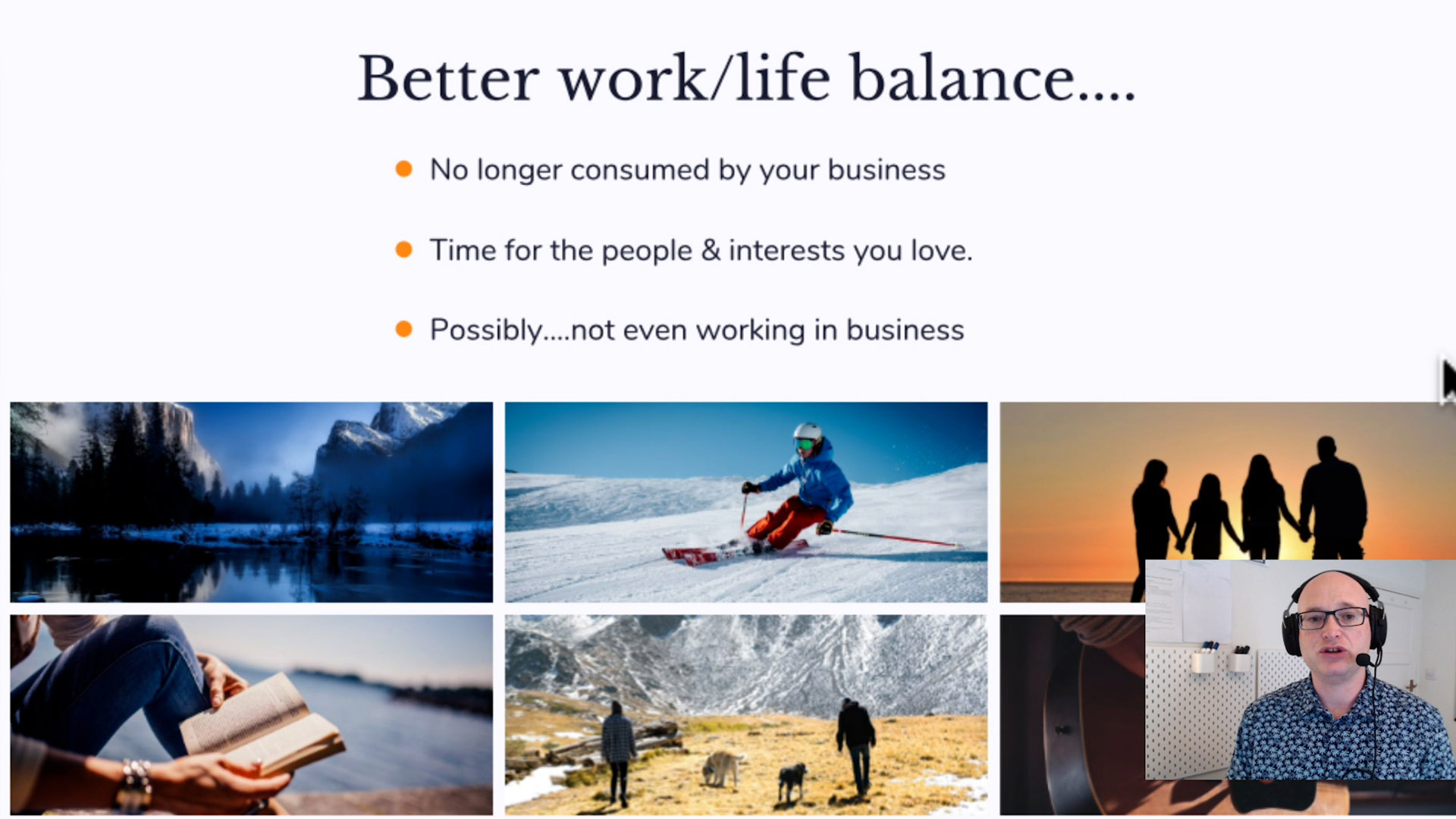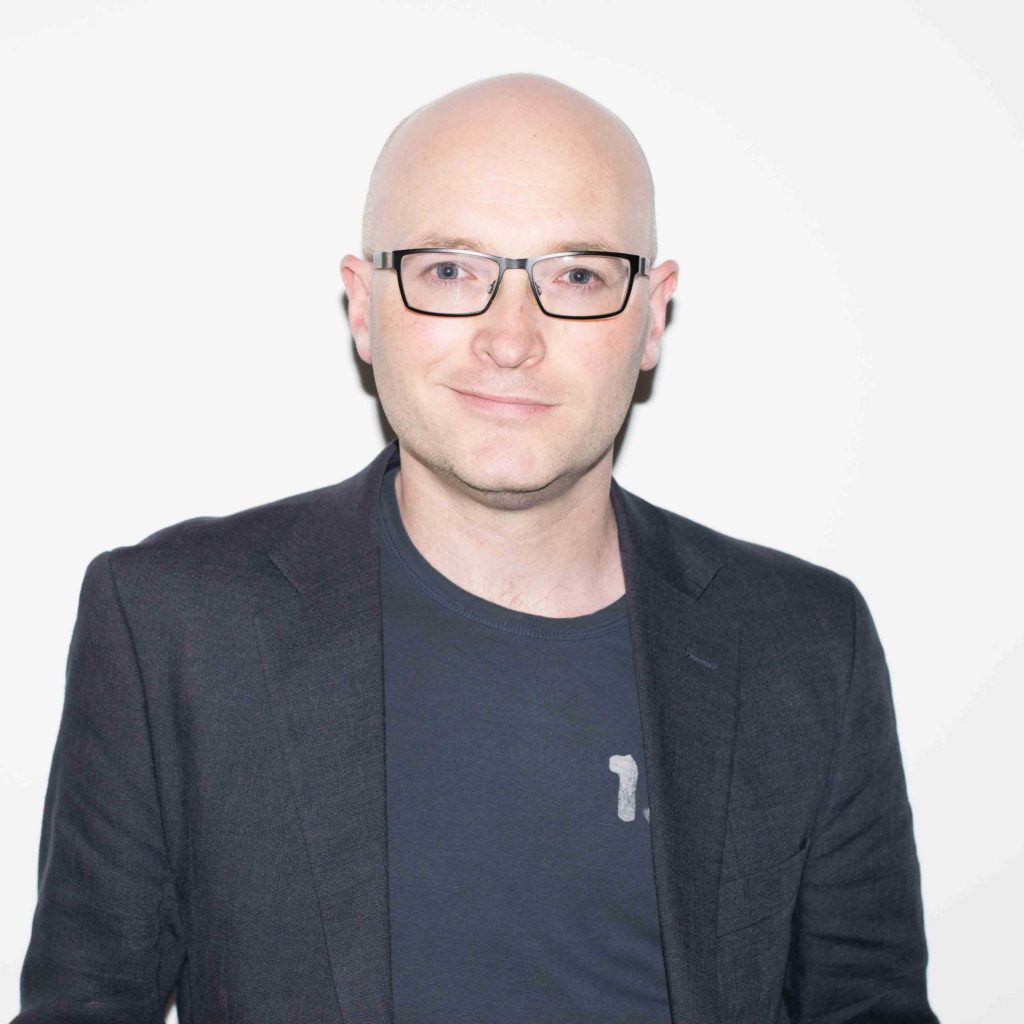Interstellar Business Show
Podcast for Technology CEOs and their teams.
It's time to grow your mind, elevate performance, and own your future 🚀
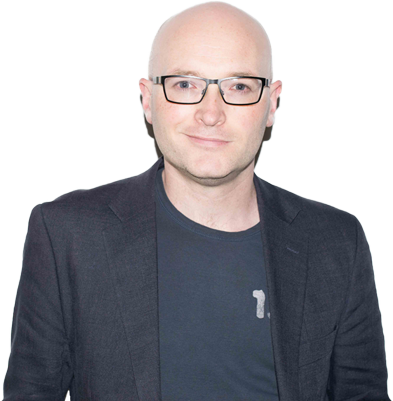
Interstellar Business Show
Episode: 0027
Team is vital: Sean McDermott on nurturing team and culture
Featuring....
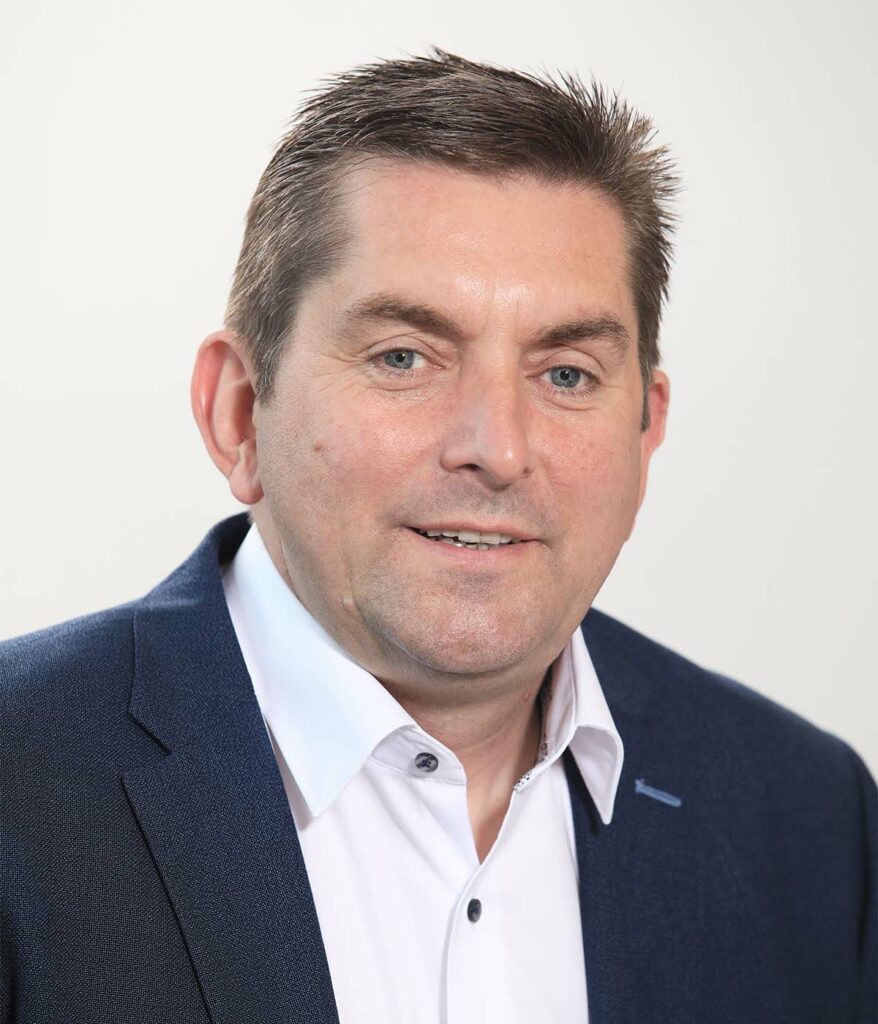
Episode Introduction
Can you relate to this…
Have you ever had a great sales strategy, but still not been able to sign enough deals?
Have you ever had a great product, but still had trouble delivering it successfully to customers?
Have you ever been in the middle of project, that’s suddenly been derailed by one of the team members?
Here’s the thing…
No matter how good your sales strategy, product, or project is….
If your team can’t perform at a good level, your business is going to struggle or move slower than you’d like….
And working in the business, isn’t going to be much fun for anyone.
Now, here’s the good news…
In today’s show
- You’ll meet the CEO of an IT business who has radically transformed his business culture
- Plus, you’ll get actionable steps, for realising your dream team.
- And finally, you’ll learn how to hire people who are the right fit for you business
This week’s guest is Sean McDermott – CEO LoughTec Ltd
Discover show notes and links at www.Interstellar.Show
Episode notes & resources
More about Sean McDermott – CEO LoughTec Ltd
Find and connect with Sean here…
Linkedin.com/in/seanmcdermottlt/
Love this podcast episode? Please leave a review here
Listen to more episodes here: Interstellar.Show
Get Andrew’s free Resources for Tech companies with teams → https://bit.ly/2Ygyoij
Join Andrew’s Interstellar Community → https://interstellarway.life/sign-up-for-newsletter/
Transcript
Please note, this transcription is autogenerated, so there may be errors.
[00:00:00] Andrew Bull: Can you relate to this?
Have you ever had a great sale strategy, but still not been able to sign enough deals?
Have you ever had a great product, but still had trouble delivering X successfully to customers?
Have you ever been in the middle of a project? That suddenly been derailed by one of the team members.
I know I have.
Here’s the thing, no matter how good your south strategy. Product or project is if your team can’t perform at a good enough level, your business is going to struggle or move slower than you’d like. And working in the business, isn’t going to be much fun for anyone either. Now here’s the good news in today’s show.
You’ll meet the CEO of an it business who has radically transformed his business culture.
Plus you’ll get actionable steps for realizing your own dream team.
And finally you’ll learn how to hire people who are the right fit for your business.
Talking of team performance. If you’ve been listening to the show for a while, you will know that team performance and culture are topics I love talking about.
Now I’ve put all my best ideas on this and everything I’ve learned from our podcasts guests. Into a brand new book that I’ve written called monsters of team performance.
You can pre-order this book today on our website interstellar way.life.
If you sign up, you will be at the front of the queue when the book comes out. So please go to interstellar way.life and do that today. If you’re serious about elevating your team’s performance.
Now, before we get started with today’s show
and meet our guests, Please make sure you subscribe and follow us wherever you’re listening today.
So you never miss an episode again.
Welcome to the show, Sean. So pleased to have you here with us today.
[00:02:26] Sean McDermott: Thanks for the invite, Andrew. It’s great to be here. And to finally get a little time to chat with you.
[00:02:32] Andrew Bull: Sean, do you mind introducing yourself please?
[00:02:35] Sean McDermott: So my name is Sean McKinney. I’m the CEO of lock tech and lock tech is an T business?
that splits into three separate divisions. We have always specialized for the last 15 years at Monte’s service provision. We also ironically have specialized from day one in remote secure work from home solutions, which it became very trendy recently.
And over the last six years, we’ve developed a cybersecurity practice delivering enterprise. Cybersecurity solutions to very specific challenges.
[00:03:09] Andrew Bull: Okay. So yeah, cyber security is a big issue. These days, there seems to be a new story every other week. In fact, there was one just last week, I think about a new crack or whatever you call it, where they find like a big breach on the incident. Is that right? I’ve gotten that right.
[00:03:24] Sean McDermott: Yeah. Yeah. I think the way things have gotten out under this will be an ongoing. Problem forever, because as soon as one of those vulnerabilities is discovered, the guys, the threat actors are already working on the next one. So it’s going to be a moving target. I think it’s a budget item that people, a lot of businesses having provisions for, but they’re going to have to they’re going to have to take it very seriously.
And you know, if you’re not doing that, your competitors are doing it. And when you’re out of business, they’re going to be in business.
[00:03:54] Andrew Bull: So keeping yourself secure and information secure should be a priority for a lot of us. Let’s just switch tracks slightly. And talk about your achievements as a person and CEO. What are the achievements you want to share with us? Sean?
[00:04:10] Sean McDermott: So my biggest achievement is the, is my five kids. I have three daughters and two sons. I love trying to invest time. Of course Molly and them and tried to make them, you know, positive people that are gonna make a really good contribution to the world and to society. Yeah. That would be my proudest achievement.
And, you know, it’s a continuous investment for me if my time and trying to share knowledge and culture with them.
I suppose then my second biggest achievement, in my opinion, as the development of the team here at lock tech, the people and the culture see, and people coming in. Like the insurance industry to become very successful in cyber security, who asked for the conversion process, that journey, that togetherness that, that really gives me a, both, yeah.
[00:04:56] Andrew Bull: congratulations on having a healthy team and culture. Was there a moment then six years ago, the triggered this change into having a positive team and culture.
[00:05:06] Sean McDermott: Thanks Andrew. Yeah, there were probably moments more than a moment. I’ll recount the ones that come to mind immediately. So I engage the services of a business consultant, a guy called Paul McKinnon who runs a business called shift control. And he really started to help me think different. I had a really nice holiday on in cork on hope strand house on the beach and whites.
I was there. I read a book called The Celestine Prophecy, and it talked a lot about being conscious of your own consciousness. You know, why do you feel the way that you do that was like a huge light bulb moment for me? The saber security opportunity was exciting because I’ve worked in my service for so long, you know, have built so many servers talk so much about VM-ware and backups, but to work with new technologies and faced new challenges after Nicole, almost 30 years in industry, that was really exciting.
So those would be two really big changes first. Yeah.
[00:06:08] Andrew Bull: On. That’s also, I’m glad you’ve got a positive team and culture. Let’s move forward into the next segment of the show, which is called
[00:06:17] Andrew Bull: In this section of the show, we ask our guests to have courage and share their secrets and stories with us. What secret don’t people know about you, Sean?
[00:06:38] Sean McDermott: I’ve had a few discussions about this recently. People look upon me as being a success and I feel I’ve only been successful because I’ve had absolutely no option. So, my shameful secret is that I was a university drop My mom and dad were both working class. Worked very hard to provide me with a really good opportunity in terms of going to university.
And I misbehaved and didn’t put the effort in that probably that RD failure has helped. Drive on and achieve because, you know, I worked in a very successful company before I started this business called Floyd food grips or meat producers, and originally in a smaller company called OMA meats.
And they had a brilliant culture and it was a brilliant place for me to develop. And it’s where I learned what I knew about IT initially. So yeah, being a university dropout maybe before that by forced air. The issue of tenacity as a person was when I was in preemie seven to primary school.
We have a thing here in Ireland called the transfer tasks. So it’s an exam that you do when you’re 11 years of age or 10, and at the Seder, what school you go to, you know, maybe a normal stream or grammar school still exists to this very day.
My teacher and peace. Evan told me not to bother doing the task because there was no point. She thought I wouldn’t be able to pass it. And for some reason I took my heaters in, did a lot of preparation. Did the exam passed it? I went to a local grammar school here in OMA called OMA Christian brothers school.
That was a really good experience for me. And. a point where I could see and save yourself though, there was some sort of a fire to succeed. But I suppose when I eventually got the chance to go to university, I didn’t seize that chance. And that has been pivotal in sculpting me as a person.
[00:08:23] Andrew Bull: It’s interesting to hear how your teacher had the opinion that you weren’t good enough to go to. Better school. And to think so often in life, people get sorted into buckets, a school or college, or at work, or maybe they develop an idea about their own level of ability. I can only do this so I can only do that.
And then they hold themselves back or someone else’s opinions hold themselves back. Do you think it’s actually something that happens a lot?
[00:08:51] Sean McDermott: I suppose the first thing I would say in reply to that, Andrew was, it wasn’t a better school, but it was more academically focused. Okay I know lots of people who are incredibly successful they are adjoiners or they are builders, et cetera. So it was just a different path. In terms of self limiting beliefs.
This is a strange country. I was born brought up during the eighties and nineties. We had a lot of trouble here, which is well-documented and there probably was a stereotypical pathway laid down for you as a young person where you know, you went out, you went to school, you did as well as you could.
You went to university you qualified. Got your 20,000 pound a year job. You met the girl who had the 20,000 pound job. You bought the 50,000 pound house you had. Three kids. And you spent the next 25 years paying off that debt. That very much is a standard Hector that is painted walls painted for kids.
I talk about getting to the top of the hill and having a, we look over the broker of the hell. So I think getting outside your comfort. Yeah. It was brilliant trying to instill in my kids, but growth mindset so that anything that they want to achieve, they can achieve if they try hard enough and put the correct effort in one regret, Andrew I have is that I didn’t travel enough.
I was too much of a card. So, you know, my mom and dad would wrap me in Cottonwood or too much. And I was quite happy to cozy up and say that Cottonwood.
Everything I’ve done in this business to make a success has been as a result of doing things that said, I’d said my personal comfort zone. Okay. So what. Biggest I suppose moments for me was I did a sales pitch about four years ago to a very famous pharmaceutical company. And I changed the way they thought about cyber security.
And I was so far, I’d say my comfort zone. It’s not real. But we got the seal, took us to. And we are currently doing work with these case. But I suppose, how do you know that you need to go outside your comfort zone until you’re rotated? So, you know, throw up on all those home conference that you get from your parents, you know, having a goal, traveling the world, you know, something I’ve done recently, Andrew is that I use a product called crystal nose and it does a desk analysis of the people who I’m going to meet using their LinkedIn.
It’s early accurate in that it tells me that I like a good spreadsheet. My God do. I love a good spreadsheet. But it also has made me aware that the people in the world are all very different. We all think about things differently. We interpret. Separate things differently. And it’s very important, you know, as a business leader, to be able to understand that, to adapt, to understand other people’s opinions, to understand the stresses, their ambitions, and to try and bite them with your own. You know, people talk a bit experience. So I’ve got the 52 years of experience and people say I’ve got good experience. And I would sort of almost kind to that with, look, I know what looks good because I’ve experienced a lot of bad stuff, you know, even with technology, you know, I’ve worked with immature Sabre technology solutions that only I say, look really good, but when you really scratch the surface, it’s an immature product.
And it’s not really fair for the market. And that was based that knowledge. We have a selection criteria for technology partners, and that’s just based on past experiences we had, and then we’ve had good experiences as well. So we knew what looks good.
[00:12:22] Andrew Bull: This is a great insight to learn from your experiences and especially I think what’s great about hearing this is about how you’ve learned from your mistakes. And I think really that’s what we will stand on eventually. Really that’s how we become authority figures by building platforms of our mistakes that we essentially become our lessons and our hard-fought life experience.
Do you think.
[00:12:44] Sean McDermott: I think that everyone makes mistakes and everyone reacts to them differently. I can say honestly, Andrew. Time four years ago, we had made a mistake with a saber product and I was, you know, slightly depressed because of it. I see quite depressed over Christmas. Basically there was a company that we’d been doing a bit of best of with, and, it was nearly like the perfect story that we’re going to be sold for millions to a very big player in the saber market.
And the seal fell through and a venture capitalist pulled 15 million overnight and the product almost would have to escrow What did I learn from that?
What I learned from that very negative experience was I can only control the controllables. There, you know, within my reach, there are things I say to Microsoft control that?
I can take no responsibility for. If things go wrong, I need to get back up on my feet again and fake me away out of the corner. Because the world’s tough place, you know, we’re all going through.
COVID at the moment it’s difficult. It’s challenging. You know, I think I’m very lucky to work in an industry that is probably. Because of what’s going on. You know, if I owned a restaurant or a bar, how would I feel at the moment? But you know, all these things will pass and, you know, we’re all going to learn something and new opportunities will present themselves.
We just have to keep us.
[00:13:58] Andrew Bull: Yeah. Separation of tasks is important. That’s something that Alfred Adler. Spelled out was the, how it’s important to realize that someone else’s task is their task and what you can yeah. And about what you can control and concentrate on the tasks you control. So I think that’s brilliant advice. Let’s just quickly touch on what you believe are the secrets of your business success, you put down hard work is the number one thing on your secrets of business success. Why is that?
[00:14:26] Sean McDermott: It’s led me to make more mistakes and then eventually less.
[00:14:29] Andrew Bull: Okay. All right.
[00:14:31] Sean McDermott: Yeah. But I think answer, you know, yeah. We worked really hard. There’s myself and another guy, Cal green. We’ve had some really tough times. We’ve lost a couple of members of staff and tragic circumstances.
We kept our shoulders to the wheel the whole time, no matter how well or how badly things were going. You know, we’ve had tough times with a good times. We were strong believers in making their own look. So, you know, we just kept working and working, focusing. So what makes us successful?
So our people, our culture. So if we’re really good team, we’ve got a culture in here. This defense. By the team we live and breathe that we will point out instances of behaviors that don’t match our culture. That we’ve all agreed. Getting really good, positive people in here has been like incredibly refreshing and the people have to much our culture.
Cause I will regularly say to my team, you’re not a three. So if you’re at a job, this is something I can’t understand. I worked for CN company for seven years, 17 years, and I was happy and work with great people, but eventually I didn’t feel that way anymore. And there’s no negative thoughts era about who I used to work for.
I just need to change. Okay. Lot of things happened in my life. I lost my father and I wanted a new challenge. So I moved on. So I can understand people who work in jobs who are unhappy, you know, at the moment. There’s absolutely no reason for that whatsoever.
[00:15:57] Andrew Bull: How do you ensure that someone is a good fit for your. When you’re hiring in the first place.
[00:16:05] Sean McDermott: you’re asking me from a very deepest secrets that I answered
[00:16:08] Andrew Bull: Okay.
[00:16:08] Sean McDermott: I I have a very predefined process for different types of people. So, salespeople, I will make them get, I say, they’re comfortable. I will make them do something incredibly difficult. As part of the second interview. The first interview is getting to NOLA, you know, sort of getting a feel for them.
See if I can work with them, if they can work with. But then the second of the few will be so will be quite a difficult task. I will really ask the SAP side step. I would say their comfort zone and present soaps them quite difficult and challenging to me. And I think that, you know, a lot of people move jobs for the sake of moving jobs.
Like I’ve always loved to work. It’s something that I spend eight, 10 hours a day doing to support. But I like it. It’s like having a good motto on your banter, spend six or seven hours a day in band as well. So you need to have a good masters
on, you need to be happy in what you’re doing. My God life’s short, you know?
So look, we try and meet people that want to be with lock tech people that loctech want to be with.
[00:17:12] Andrew Bull: That’s a great answer. I like the idea about pushing yourselves. So. People out of their comfort zones in, into that’s interesting because I suppose salespeople do need to be outside their comfort zones a lot. That’s picking up the phone, sending cold emails, that kind of thing. Let’s move forward to our next segment of the show, which is called
In this segment of the show. Our guests will share a big idea that will help you elevate your mind or your business or your team and culture. Sean, what’s the big idea that you want to share with our listeners today?.
[00:17:52] Sean McDermott: So a lot of people will ask me, how do you build a good business? I give up a really good job to start this business. I was incredibly naive about seals and ministration XL. So, what I’ve learned over the 15 years is like the importance of the team that you’ve got and the culture you develop, the feeling of the workplace, the interaction with your customers are vital. I described this to some of my team recently, as this is the way that I go, mark, this is my vision. And I need people who want to live that vision with me the way I wanted lived and not everyone will agree with that. And that’s absolutely fine. So. Things that really work for us. Yeah. So really people who match our culture, people who match our values, people who love our customers, people who will commit to the team, people who will help us develop the plan to adjust the plan.
That’s the really important lesson. We have learned as a company. We spend a lot of time interacting with their team and giving them additional responsibilities. So, I have to get I say my comfort zone by letting them get all the things that I used to do with one of the team closed a really big seal here today, almost a hundred thousand pine.
The it’s been here almost a year and done a brilliant job with us, but I have to say. Almost Steinback like a father looking at his kids, taking the first steps and hope they don’t fall over. But it’s a huge non-taxable benefit that I see, you know, people grown into really confident individuals that are just doing things too far at their conference.
So I chose the conference room every day. It’s incredible.
[00:19:31] Andrew Bull: Have you had to learn to accept less than perfection then, because I know a lot of CEOs and I talked to them and they admit themselves, or they say themselves that they are perfectionists. So it’s very hard to do something perfectly. I think, without spending more time on something than it’s actually worth.
That you get back in return. Have you learned to not expect perfection from people or maybe I should say, have you learned not to demand perfection from people or learned not to demand that things are done your exact way?
[00:20:05] Sean McDermott: I think that perfection does not exist anywhere in the world. I think that some CEOs can think that they’re perfect. I absolutely knew what I’m not. My coming plan is to employ people who are smarter than me and let them get on. And I will direct them towards the path that we have designed really big thing for us.
Andrew is committing to a plan, commit to paper is the first thing, cause everything we’ve ever planned has happened. And the second thing has been encouraged or have enough courage to go back to that plan and adjusted on a regular basis.
[00:20:40] Andrew Bull: And not feel foolish that you’ve had to change your mind, or you’ve not been able to see something through, have the courage to go, oh, actually this isn’t working. We need to change it now.
[00:20:49] Sean McDermott: I can give you a really good example of very recent for me. So in our cybersecurity division, we will sell solutions to really huge companies. The likes of Sage are a customer of ours and, you know, 12 months ago when I read a variation of fresh version of, for our business strategy for the next two years, I think I had alluded to the point that look, we don’t, we lock tech, do not believe that there’s a huge opportunity for cybersecurity with her money service customers.
So those customers can be small local businesses. And I say that very respectfully, you know, families who’ve built up a small engineering firm over 10 years, employing 50. On one of the things we do is we sell or my industry. Does they talk about critical infrastructure protection? You know, if you’re a small business, employing 50 people, your infrastructure is critical as well.
So you want looked after. So we’ve started selling security as a service to Armani money, service plants, and a lot of the smart people are realizing, look, the soup I really need to do. And something I thought was not an opportunity 12 months ago. It’s the massive opportunity.
[00:21:55] Andrew Bull: So yeah, you’re having to adapt to the marketplace and how things are changing and you need that. You need that flexibility and adaptability within your business and your team.
[00:22:06] Sean McDermott: And you need a level of humanity to accept the fact that I was wrong. Totally wrong. I remember Andrew. Two years ago, Cal who’s a partner in the business with me, said to me, oh, there’s going to be locked down. So we’re going to have to work for. I said, start a chance. That’s never going to happen. How wrong was I.
[00:22:25] Andrew Bull: What happens when the culture isn’t working as you’d like, or when all of you think is not working as you’d like.
[00:22:35] Sean McDermott: So one of the things that I have done in my own personal development is to start to read a lot more under, to take a bit of time, you know, the likes of Damian Hughes produces some brilliant books.
Matthew Sade, you know, they look a culture of what good culture looks like.
That’s been a game changer for us because you know, another really positive thing we do in here is we do a quarterly business review with the whole team. So I will spend a couple of days preparing a presentation. So that presentation happens four times a year and I will do it in January. On the 14th, I will start to prepare for the next one and IPS the structure of that presentation on our culture values. And I will give examples of positive examples. And if there’s anything negative for this hop, then I will call it out because our team has got a bonus scheme. So the better we perform the better everyone a year.
So if someone’s not performing, I need to call it out for everyone else’s sake, that process I’m evolving and changing all the time. So at our next QBR, I’m going to have two members of the team do there are, so I see three members of our team do a presentation on. On marketing activity also on cyber security seals of what’s happening there and also Bonnie service and work from home sales.
So get buy-in get the people, convinced, get them to believe
[00:23:59] Andrew Bull: what values drive your culture then Sean?
[00:24:03] Sean McDermott: The the culture values in lock tech have been defamed by the whole. They have evolved over the last 15 years. So the values that are currently in place are collective ingenuity, ferocious, integrity, unflinching, courage, passionate service, and the family.
[00:24:23] Andrew Bull: Oh, family’s not unusual.
[00:24:25] Sean McDermott: I. What was unfortunate enough this year to have lost my best friend. He lost a battle with cancer after six months and he had a huge impact on this business. And so family way, family That’s how I want to run the business. That’s how the business wants to be run. That’s how the team wants to be seen.
And my friend, one of the things that he instilled in me was to look after my. We’ve done simple things that people overlook. Like we have a death and service package in place for a team, which is something you never want to think about. But unfortunately there’s been a couple of occasions where we’ve had to use it.
And I know that, you know, a few years salary doesn’t make any difference to families just lost a loved one, but maybe in the long-term it helps them to, we bet it might just help for a day or a month. So that’s way family. I want to look after my people.
[00:25:22] Andrew Bull: That’s brilliant. And it’s nice not to just see people as a resource, but as having their own value in themselves anyway.
[00:25:31] Sean McDermott: It’s something you said earlier, Andrew. How about, you know, we’re always all now, you know, people expect you to be available 24 7, 365. I hit the term, you know, I remember 25 years ago being really enthused and excited about getting my first Blackberry. My God heard, I wish that hadn’t happened. You know, I’d again, go back to the desk analysis.
You’ve got different cultures out there in the world’s getting much, much smaller. But you know, if you go to America, you know, People are 24 7, 365. I’m not, I don’t want to be I want to work hard. I don’t mind working 10, 12 hours a day. It’s not a problem, but I want to switch off. Hey, I want quality time with my family.
I want to stand back, take a look at me, family, see how you’re doing, because things can go very wrong, very easily. So, yeah, but it’s getting that, you know, I, when you deal with different cultures, they have a different view. And you have to understand that yourself and find some way to work around that.
[00:26:30] Andrew Bull: So moving back to the big idea that a good team is the secret to any success. And this is a concept that I believe in as well, because I believe it’s the foundation. Of everything that your business does is built upon team performance.
Like you can have a great sales strategy or you can have a great product, but if your people can’t deliver them or they don’t have the right attitude or motivation or people don’t communicate well, then it’s pointless. Having a great sale strategy or point is having a great product.
You need that team there to deliver them. How, from your experience does a bad team lead to fail.
[00:27:05] Sean McDermott: When I wake up in the morning, I want to go to work. Yeah. I usually wake up at 5:45 AM I go to the gym? Three teams at 6:30 AM during the week and the evening before I’ll do a 30 minutes cardio session, because it’s really good for me, man. And it relaxes me and there’s no broadband coverage in the gym.
It’s excellent. This is just my space, my bolt hole. So that’s changed if I go back a number of years ago in this business, I was waking up every morning with a lot of problems in my head. There was going to face that day. And the biggest problem I had is I didn’t have the people to deal with the problems. You know, they were threes in the wrong place. I have never employed any bad people, but I have employed people that didn’t really fit or match our values. And they came to work for us for the wrong reasons. So, you know, the way I feel about my work is a huge flection on the positive culture that we’ve developed.
[00:28:07] Andrew Bull: Fantastic. I love that. Love the positive culture. So if people wants to take easy first steps, we’ve getting a great team in their business. What do they need?
[00:28:17] Sean McDermott: It’s a really good question. I think that a big moment for me, it was getting somebody from, I say the business that I could talk to about this. Myself become a conscious of what looked good and what looked bad with the team was really important. And then starting to put a strategy down on paper and also being realistic that there was no magic bullet that you’re working on a click, your fingers and everything was sorted.
It takes Tang, it takes planning. It takes a lot of revisiting the plan. But it’s definitely possible, you know, books, you know, get. So every time I read a book I pick up, so you want to learn some small thing. You used to go to all the big saber events. You know, the cost of them is ludicrous, but you could meet that one person or get that one idea that makes the whole trip worthwhile.
So trying to commit to read a book, every, both. And get two or three books you want to read 10 times.
[00:29:18] Andrew Bull: Yeah, reading a book is in invaluable. Definitely. And how can CEOs take advanced steps then with this big idea? So the, if the easy first step. Reading a book. And by the way, listeners, my book is out at the end of January called monsters of team performance. And I will drop a link to that in the show notes.
But if we move beyond reading a book and getting some really good ideas what’s some advanced steps that people can take.
[00:29:48] Sean McDermott: So personally for myself I had a long, hard look at me. So when the culture is defined, I have to be the leading culture architect and I need a number of cultural architects in the business as well to reinforce the message and help everybody live the culture. So know my. Is the most important behavior in the company.
So, you know, over lock time, I kept it mess. I put all a few pounds that’s not the right example to give my people. I have to be healthy. I have to be fit to have to be alert. So leading your team properly and, you know, I suppose having, and I hope I have. A really good level of humility that, you know, okay, so the businesses going, okay, I need to keep directing it.
I need to keep improving myself. I need to have that growth mindset. You know, I fully understand personally, I do not know everything and I never will, but I can continue to improve every day. They will see. And every day’s a school day, it definitely is.
[00:30:54] Andrew Bull: Yeah, leading by example is such a powerful thing to do. a first step, if you’re not going to walk the walk, then why should your team right.
[00:31:01] Sean McDermott: When I talked to you about our culture values and align the team to define them I want those values to come from them. I want them to see a clear picture of where we’re going and why we’re were going that way. And whenever I started that process, I talked to him about it because I told them I’ve got examples.
I’ve seen, you know, from all the big corporate companies where they will set the sort of stop lanes. And, you know, I don’t want to name any companies in particular, but the values are not real. They’re not authentic. You know, it’s like creating Andrew social media content. The best content you can produce on social media is your content start cutting pierced.
So not sharing the bloody link. You know, what personal photograph of use talking to somebody and then put a few thoughts. Your thoughts, not somebody else’s thoughts don’t, know, creates of interests for you. And again, as I say to my comfort zone but we’ve started to do that a lot more and we’re trying to improve there all the time.
[00:32:00] Andrew Bull: Yeah, it takes strength to be vulnerable online and show your authentic self and not try it again, be that perfect person or brand, but that’s what makes you truly relatable. This is a good point to leave this section. I think we’ve covered a lot here related to team and culture.
Let’s move forward into the next section
[00:32:22] Andrew Bull: In this segment of the show, our guests and leaders share how they’re empowered and staying on track with their goals, their dreams, and their future. Sean, how do you keep a balance between the present and the future? How do you stop yourself living in the clouds? Just thinking about the big things you’re going to do down the road, and then ignoring the joys and immediacy of today?
[00:33:05] Sean McDermott: I think I’m always very realistic. Not everyone is, and it’s perfectly fine to accept test flight. So I will commit to a plan I will measure constantly KPAs and say what want be nice spreadsheets to see how we are progressing towards that. I’ve mentioned before and I, a guy called Paul McKinnon from shift control.
Who’s my mentor. And he always tells me to start my journey with a destination in mind. And I think I’ve audited that night because I would say certainly, yeah, you must set destination with a journey in mind, but you need to enjoy the journey, you know, so day to day being happy, working in a positive business.
Develop the people, seeing people happy, seeing people being enthusiastic about their work is vitally important to us. And, you know, we’ve spent a lot of money and time to put systems in place where we’re getting a lot of positive feedback from our customers or better performance.
and you know, we incentivize the team to, to treat their customers with high levels of. Even maybe sometimes what the stuff deserved. Those are all things that have helped us get to another level thought I’ll say it. We, those are all levels to get to. And we’re into a big phase though, where it’s like we’re at the end of December or new year.
We’ll start on the 1st of January. You know, I just want to come back recharged, refreshed, and ready to go.
[00:34:33] Andrew Bull: Awesome. I’m so glad to hear that. You’re so positive and enthusiastic for 2022.
Let’s jump into the last segment of the show,.
So what’s the big result that our tech leaders and CEO’s can get if they action, your big idea around team and culture.
[00:34:53] Sean McDermott: So I think, answer that once you get that in place And the company starts to live it that those cultures day to day if you get your social media activity, correct. If you’re interacting with those people that you will become a very attractive proposition for more of the good people that you’re already.
So you create the self-propel success model, where you’re getting, you know, positive people into positive culture. You know, every day is a win. I hope we can go from strength to strength, but the who, maybe those things can go wrong from time to time. And it’s just important to, to take that leap moment to adjust your seals to face the headwinds.
[00:35:34] Andrew Bull: And what are the big takeaways that you want people to remember about team and culture.
[00:35:39] Sean McDermott: So have a real culture, how the team define the culture point out positive examples of good culture.
Have the courage to point out, examples of bod culture or people not loving your culture, you know, seize upon that quickly.
[00:35:54] Andrew Bull: Awesome. And where can people go to learn more about you and your business?
[00:35:59] Sean McDermott: You can jump onto our website, which is www L O U G H T E c.com. So not very Meisner for me because I live beside a lock, which is a small lake here in Ireland. Most of our people we speak to in all parts of the world. They think we’re called lough tech. We’re actually called lough tech and we’re very proud of that fact.
[00:36:22] Andrew Bull: That’s very amusing because I didn’t even realize there were locks in Northern Ireland. I thought that was something only in Scotland. So it just shows another bit of my ignorance being exposed again today. And interestingly, I think. I did think it was loud tech because I come from Louton, in Essex.
So like thanks for correcting me. So yeah, go, we’ll put also the link to Sean’s website in the show notes as well, and maybe his business LinkedIn profile as well. So. Connect with the business and connect with Sean. We’ll give you all those details. We’ll also include links, for my book and also for the books that Sean’s talked about on the show today as well.
Because I’m sure he’d love you to connect with those big ideas. Team and culture. So all I’ve got left to say is thanks for being such a brilliant guest. Sean really enjoyed talking with you today and appreciate your generosity and your sharing of all those ideas and experiences.
You’ve been a great guest. Thank you.
[00:37:24] Sean McDermott: Thanks, Andrew, it’s been really good to meet you at long last and hopefully some of what I’ve said makes some sense to somebody somewhere.
[00:37:31] Andrew Bull: I’m sure it will. Thanks again Sean.
My thanks to Sean for being such a fantastic and thought provoking guest speaker, our conversation reaffirmed a lot of ideas. So I’d already had about team performance and also introduce some new ones. I love the idea of the quarterly review. Which is based around team values. I think that’s such a refreshing way to look at the value that both team members and the company generates.
It’s also great because it increases transparency in the business. So people don’t have to waste time hiding stuff from each other. And we all know that people hiding things can be a massive drag on a business or even worse, a big risk to the business. These quarterly value based reviews or something, I will be recommending to other business leaders. And I think it’s something you should consider too.
Don’t forget if you’re serious about elevating your team’s performance, you need to grab a copy of my book. Monsters of team performance, you can join the waitlist@interstellarway.life. Now if you haven’t already done so hit that subscribe or follow button wherever you’re listening today. And all I’ve got left to say is thanks for being here. Have courage own your future. Take action.

